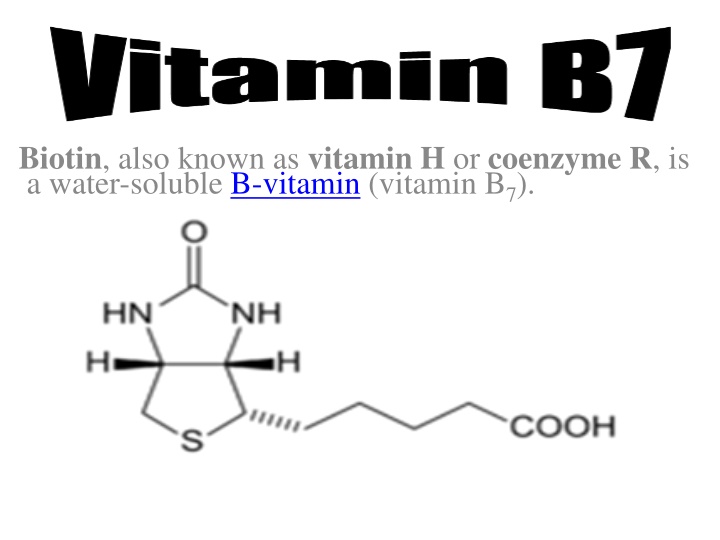
The Role of Biotin in Health and Nutrition
Biotin, also known as vitamin H or coenzyme R, is a crucial water-soluble B-vitamin that plays a vital role in metabolizing proteins, fats, and carbohydrates. It also contributes to healthy nails, skin, and hair. Discover the sources of biotin, learn about deficiency risks, and understand who might be at an increased risk.
Download Presentation

Please find below an Image/Link to download the presentation.
The content on the website is provided AS IS for your information and personal use only. It may not be sold, licensed, or shared on other websites without obtaining consent from the author. If you encounter any issues during the download, it is possible that the publisher has removed the file from their server.
You are allowed to download the files provided on this website for personal or commercial use, subject to the condition that they are used lawfully. All files are the property of their respective owners.
The content on the website is provided AS IS for your information and personal use only. It may not be sold, licensed, or shared on other websites without obtaining consent from the author.
E N D
Presentation Transcript
Biotin, also known as vitamin H or coenzyme R, is a water-soluble B-vitamin (vitamin B7).
Biotin plays a vital role in: 1-Helping the body metabolize proteins, fats and carbohydrates. 2-Helping the body process glucose. 3-It also contributes towards healthy nails, skin and hair. It is therefore found in many cosmetic and health products for the skin and hair.
Sources of biotin Biotin is consumed from a wide range of food sources in the diet, but few are particularly rich sources. Foods with relatively high biotin content include Egg yolk (raw). Egg white reduces egg yolk's biotin effectiveness in the body. People who consume just egg white for many years without biotin supplementation have a slight risk of not getting enough vitamin B7. Liver, Peanuts,Yeast,Bread, whole-wheat,Cheese, cheddar,Pork,Salmon,Avocado,Raspberries and Cauliflower (raw).
Deficiency Biotin deficiency is relatively rare and mild, and can be addressed with supplementation. Such deficiency can be caused by the consumption of raw egg whites (eating two or more uncooked egg whites daily for several months has caused biotin deficiency that is serious enough to produce symptoms), which contain high levels of the protein avidin, which binds biotin strongly. Avidin denaturates upon heating (cooking), while the biotin remains intact.
People who are at an increased risk for vitamin B7 biotin deficiency include those with the following: 1-long-term use of certain anti-seizure medications prolonged antibiotic use 2-intestinal malabsorption issues or serious digestive disorders like Chron s disease, celiac disease, or leaky gut syndrome. There isn t a good laboratory test for detecting biotin deficiency, so this condition is usually identified by its symptoms. Requirement increase in: 1-Pregnancy and Lactation. 2-Oral antibiotic therapy for prolonged periods.









